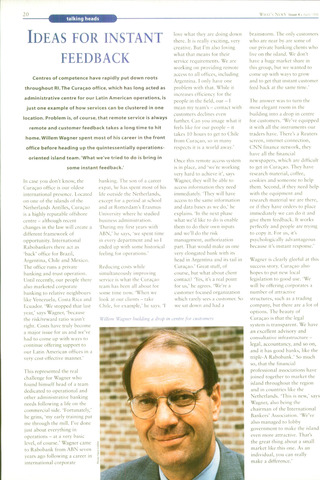Ideas for instant
FEEDBACK
20
talking heads
WHAT'S NewS Issue 4 April 1998
Centres of competence have rapidly put down roots
throughout RI.The Cura^ao office, which has long acted as
administrative centre for our Latin American operations, is
just one example of how services can be clustered in one
location. Problem is, of course, that remote service is always
remote and customer feedback takes a long time to hit
home. Willem Wagner spent most of his career in the front
office before heading up the quintessentially operations-
oriented island team.'What we've tried to do is bring in
some instant feedback.'
In case you don't know, the
Cura$ao office is our oldest
international presence. Located
on one of the islands of the
Netherlands Antilies, Curagao
is a highly reputable offshore
centre - although recent
changes in the law will create a
different framework of
opportunity. International
Rabohankers there act as
'back' office for Brazil,
Argentina, Chile and Mexico.
The office runs a private
banking and trust operation.
Until recently, our people there
also marketed corporate
banking to relative neighbours
like Venezuela, Costa Rica and
Ecuador. 'We stopped that last
year,' says Wagner, 'because
the risk/reward ratio wasn't
right. Costs have truly become
a major issue for us and we've
had to corae up with ways to
continue offering support to
our Latin American offices in a
very cost-effective manner.'
This represented the real
challenge for Wagner who
found himself head of a team
dedicated to operational and
other administrative banking
needs following a life on the
commercial side. 'Fortunately,'
he grins, 'my early training put
me through the mill. I've done
just about everything in
operations - at a very basic
level, of course.' Wagner came
to Rabobank from ABN seven
years ago following a career in
international corporate
banking. The son of a career
expat, he has spent most of his
life outside the Netherlands,
except for a period at school
and at Rotterdam's Erasmus
University where he studied
business administration.
'During my first years with
ABN,' he says, 'we spent time
in every department and so I
ended up with some historical
feeling for operations.'
Reducing costs while
simultaneously improving
service is what the Cura<;ao
team has been all about for
some time now. 'When we
look at our clients - take
Chile, for example,' he says. 'I
love what they are doing down
there. It is really exciting, very
creative. But I'm also loving
what that means for their
service requirements. We are
working on providing remote
access to all offices, including
Argentina. I only have one
problem with that. While it
increases efficiency for the
people in the field, our - I
mean my team's - contact with
customers declines even
further. Can you image what it
feels like for our people - it
takes 10 hours to get to Chile
from Cura^ao, so in many
respects it is a world away.'
Once this remote access system
is in place, and 'we're working
very hard to achieve it', says
Wagner, they will be able to
access information they need
immediately. 'They will have
access to the same information
and data bases as we do,' he
explains. 'In the next phase
what we'd like to do is enable
them to do their own inputs
and we'11 do the risk
management, authorization
part. That would make us one
very elongated bank with its
head in Argentina and its tail in
Cura^ao.' Great stuff, of
course, but what about cliënt
contact? 'Yes, it's a real point
for us,' he agrees. 'We're a
customer focused organization
which rarely sees a customer. So
we sat down and had a
brainstorm. The only customers
who are near by are some of
our private banking clients who
live on the island. We don't
have a huge market share in
this group, but we wanted to
come up with ways to grow
and to get that instant customer
feed back at the same time.'
The answer was to turn the
most elegant room in the
building into a drop in centre
for customers. 'We've equipped
it with all the instruments our
traders have. There's a Reuters
screen, internet connection,
CNN finance network, they
have all the financial
newspapers, which are difficult
to get in Curagao. They have
research material, coffee,
cookies and someone to help
them. Second, if they need help
with the equipment and
research material we are there,
or if they have orders to place
immediately we can do it and
give them feedback. It works
perfectly and people are trying
to copy it. Hor us, it's
psychologically advantageous
because it's instant response.'
Wagner is clearly gleeful at this
success story. Cura^ao also
hopes to put new local
legislation to good use. 'We
will be offering corporates a
number of attractive
structures, such as a trading
company, but there are a lot of
options. The beauty of
Cura^ao is that the legal
system is transparent. We have
an excellent advisory and
consultative infrastructure -
legal, accountancy, and so on,
and it has good banks, like the
triple-A Rabobank.' So much
so, that the financial
professional associations have
joined together to market the
island throughout the region
and in countries like the
Netherlands. 'This is new,' says
Wagner, also being the
chairman of the International
Bankers' Association. 'We've
also managed to lobby
government to make the island
even more attractive. That's
the great thing about a stnall
market like this one. As an
individual, you can really
make a difference.'
Willem Wagner building a drop in centre for customers

